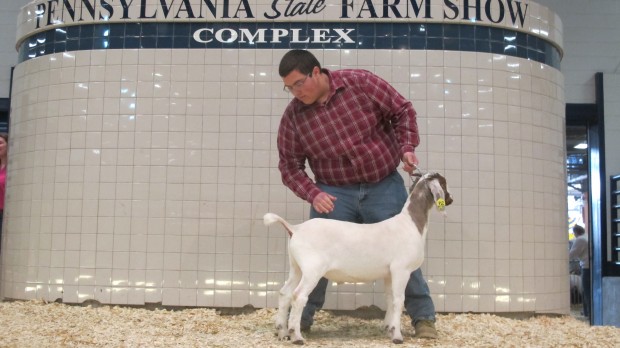Gas companies buy livestock, goodwill at Pennsylvania Farm Show

Marie Cusick/ StateImpact Pennsylvania
Gas companies stopped by the Farm Show this week to bid on livestock from kids who live in the counties where they drill.
Much of Pennsylvania’s Marcellus Shale drilling takes place in rural areas. Over the years, gas companies and farmers have had to learn how to co-exist. Sometimes those relationships are positive. Other times, they can be rocky.
That’s why some drilling companies come to Pennsylvania Farm Show—where they make an effort to buy livestock and a little goodwill.
Organized chaos
It’s a hectic scene inside the Farm Show complex in Harrisburg.
“It’s very energetic. There’s lots of stuff going on,” says 15-year-old Brady Feicht. “I refer to it as organized chaos.”
Feicht is one of the many kids here at the youth livestock auction showing off his hard work—a 129 pound lamb.
“The money I make from it will go back into an account where I’ll buy lambs for fairs and buy feed.”
Someone in the crowd just bought his lamb for $800.
The buyer is Rob Boulware, head of external communications for the natural gas drilling company Seneca Resources. He picked Feicht out of the crowd—not because of his lamb– but because he’s from Clarion County, where the company has a number of shallow gas wells.
“There is a lot of [gas] infrastructure,” says Boulware. “You tend to drill where people aren’t— and that would be rural areas where farming exists.”
Boulware’s spent about $30,000 on behalf of Seneca—buying up livestock at county fairs where the company operates, and this week at the Farm Show.
It’s good for public relations, but he also has a soft spot for agriculture. He grew up on a farm in Westmoreland County and used to raise livestock too.
“We did mainly horses, but we had a couple of pet projects as well, some chickens, hogs and a couple of cows,” he says.
“I understand the hardship”
He knows how tough farming can be.
“I know what it’s like to raise a livestock project and try to bring it to auction. I also understand the hardship if you don’t make a sale, and I understand the disappointment if buyers aren’t there.”
That’s why he also bought a 258-pound Berkshire hog from 18-year old Abby Gillis. She lives in Westmoreland County where Seneca has pipelines.
“He paid $325 for it and market price would have been about $180,” says Gillis. “So yeah, a big profit.”
She plans to use the money to help pay for college.
“I’d like to pursue a degree in the medical field,” she says. “A lot of the money I’ve made showing my animals over the years will be put toward college funds.”
Most of the animals sold here get processed for food, but some are kept for breeding.
Kay Brockett is a Seneca leaseholder and stay-at-home mom who volunteers at the auction. She says smaller local businesses do support the students, but the deep pockets of the oil and gas industry are helpful.
“They really do provide a wonderful service for the kids, because they have the dollars behind them.”
Boulware has worked to convince some of his friends in the industry to join the auction too– like George Stark, a spokesman for Cabot Oil and Gas.
“Rob and I are longtime friends, more than 20 years,” says Stark. “He was somebody that showed me early on how this was benefiting the students and their families.”
Cabot spent about $2,500 this week at the Farm Show bidding on livestock from kids in Susquehanna County, where it does most of its drilling
















